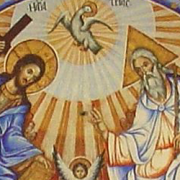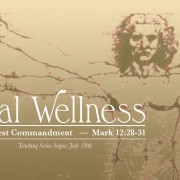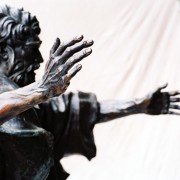Inexplicable God
One of the most mind-bending and yet rewarding things we can do is meditate on the trinitarian nature of God. While not all agree, the Trinity, or Triune nature of God, is a reality most definitely affirmed by the teaching of Scripture. The biblical testimony portrays God as existing as three separate persons who all equally share one divine essence. These persons have revealed themselves as God the Father, Jesus (who is God the Son), and God the Holy Spirit in the Bible.
The Bible and the Nature of God
The biblical teaching on the nature of God can be summarized as follows:
1. The Father is God (Jn. 6:27)
2. The Son is God (Jn. 1:1-3; Heb. 1:7-8; Col. 1:13-17)
3. The Spirit is God (Gen. 1:2; Job 33:4; Ps. 104:30; Acts 5:3-4; Acts 13:1-4)
4. There is only One God (Deut. 6:4; Mk. 12:32; Rom. 3:30; 1 Cor. 8:6)
5. The Father, Son, and Holy Spirit are NOT each other (Matt. 3:16-17; Jn. 1:1-3 & 18; Matt. 28:19; 2 Cor. 13:14)
What Does the Biblical Data Mean?
The Bible clearly teaches each of the above five realities regarding the nature of the One true God. There is only One God. He exists in the three Persons of the Father, Son, and Holy Spirit. Each of the three are divine, and they are not One another. They are not three separate God’s. They are not one divine Person portraying Himself three separate ways. They are three literally distinct Persons unified by one divine essence.
Um, Can You Explain that Please?
Usually this is the point that our brain starts to hurt. As we try to stretch our finite minds to the point where we can wrap our proverbial arms around the awesome and infinite reality of God’s nature, feelings of futility and inadequacy soon follow. While we can certainly apprehend the biblical teaching regarding the Triune nature of God, we cannot fully comprehend it in it’s fullness.
How ’bout an Illustration?
The truth is that we cannot even adequately illustrate the Trinity. Many have tried to do so, and I personally believe they have done so in vain. Even the closest illustrations fall short at the end of the day. Let me point out the most common illustrations people set forth in attempt to better understand or articulate the reality of the Trinity:
1. The Clover- Some say that to illustrate the nature of God to the people he was trying to reach in Ireland, Saint Patrick would point to the three-leaf-clover. He would suggest that the nature of God is like a clover that, while being one entity, has the three parts in the leaves which ultimately all connect as one.
2. The Egg- Some suggest that the fact that an egg has three parts (yoke, white, and shell) while still being one egg can serve as an illustration of the Trinity.
3. The Water- Others point to water which can exist in three forms (gas, solid, liquid) as an illustration of the Trinity.
4. The Family- Still others would point to the family as a potential illustration of the Trinity. Admittedly this is my personal favorite. These folks point out that, biblically speaking, men and women become one flesh through marriage and sexual relations. When parents reproduce and have a child, the child genetically proceeds forth from the essence of both the father and mother who are one flesh through marriage. In the end, it is contended that this illustrates the Trinity in that the human father, mother, and child are all three separate persons and yet one in a legitimate sense.
The truth is all of these illustrations fall short for various reasons. And while helpful for lifting our minds to a perhaps good starting place as we begin to try and appreciate the complexity and beauty inherent within the Triune nature of God, none of these should serve as absolute pictures of the precise nature of God.
Reaction Time
When we get to this point in meditating on the Trinity, I have found people react in two ways depending on where they’re at with Jesus in their personal lives. First of all, the skeptical non-Christian begins to mock. They say, “If I can’t explain it, or find something of comparable nature to illustrate it, it must not be true.” Secondly, the new or untaught Christian might begin to doubt. They might find themselves thinking, “Can this be true if we cannot explain it? Are the skeptics correct, and the Trinity is just another made-up human superstition?”
Answers for the Skeptic
In response to the skeptic I would say three things:
1. Either the Bible is God’s Word, or it isn’t. Many who are in opposition to the doctrine of the Trinity also affirm the inspiration of the Bible. Their are some religious groups who affirm the divine inspiration of the Bible, and yet because the Trinity doesn’t make sense to them logically, they reject it and come up with other translations of Scripture foreign to the original languages in which the Bible was written for the sake of supporting their view. This is all done to justify making Scripture conform to their logic, rather than bringing their supposed logic into conformity with the plain meaning of Scripture. At the end of the day either the Bible is God’s Word and must be accepted, or it’s not. But you can’t have your cake and eat it too on this one. If the Bible is God’s Word the Trinity is the only possibility based on the teaching of the whole counsel of God as summarized above. Either the Bible is God’s Word or it’s not.
2. Don’t think more highly of your logic than you ought. Don’t you think it’s possible that there might be some things that are true about the infinite, sovereign Creator of the universe that are just a little difficult to wrap your much smaller, finite mind around? Do you really think you’re so smart that you should be able to fully wrap up everything about the nature of God in a nice little intellectual package that is easy to understand and explain? Don’t think more highly of your logic than you ought.
3. Don’t be a hypocrite. The fact is that every skeptic who scoffs at the doctrine of the Trinity based on it’s incomparableness is a hypocrite. They know that there are many things they affirm to be true though they can’t fully understand or explain them. I know there are many things like that in my life. There are things that I know are true, that are scientifically explainable, that I still can’t fully comprehend. I know there are scientific explanations regarding how giant aircraft carriers made of steel, transporting thousands of people, planes, and supplies can float in the water, but it still doesn’t make sense to me. I know science can explain why it is that a fly can float in the cab of my truck while I’m driving 75 down the freeway and not splat against my back window, even though I know that fly isn’t moving in the same direction as my vehicle, at the same speed. And yet, if I were to stand up and jump in the air in the back of my truck going the same speed, I would be dead in the road. How does all that work? I mean, is there a problem in the matrix, or what? You can explain it to me scientifically, but it still won’t fully make sense. I believe even the most ardent skeptics regarding the Trinity hold to many truths in their lives which they apprehend and affirm while knowing they cannot fully explain or comprehend them. The honest skeptic would agree. Don’t be a hypocrite.
Answers for the Christian
For the new or untaught believer who is struggling with doubt over their inability to articulate, understand, or illustrate the Trinity, I would comfort you with the truth of Isaiah 40:18: “To whom then will you liken God? Or what likeness will you compare to Him?” In short, the Bible itself declares the inexplicable nature of God! We don’t need to worry about not being able to explain or illustrate what God has already told us is inexplicable and without illustration. Part of being God is being absolutely unique amongst all other things in existence! The reason you can’t point to an illustration and say, “That is what God is like,” is because He is altogether unique and incomparable in every single possible way!
At Refuge we like to say in regard to meditating upon the mysterious nature of our God that, “Logic can only take you so far before all you can do is stop and worship in awe!” I hope this brief reflection on the inexplicable nature of the One True and Living God has inspired you to do that. Let logic, reason, and understanding take you as far as it can. And when you come to the end of that finite road, worship the Father, Son, and Holy Spirit who together exist as our One True God!











